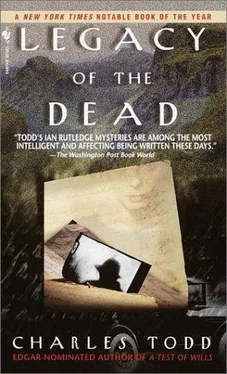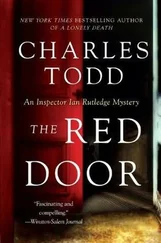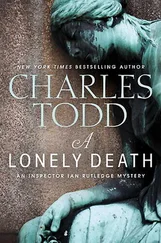Charles Todd - Legacy of the Dead
Здесь есть возможность читать онлайн «Charles Todd - Legacy of the Dead» весь текст электронной книги совершенно бесплатно (целиком полную версию без сокращений). В некоторых случаях можно слушать аудио, скачать через торрент в формате fb2 и присутствует краткое содержание. Жанр: Полицейский детектив, на английском языке. Описание произведения, (предисловие) а так же отзывы посетителей доступны на портале библиотеки ЛибКат.
- Название:Legacy of the Dead
- Автор:
- Жанр:
- Год:неизвестен
- ISBN:нет данных
- Рейтинг книги:5 / 5. Голосов: 1
-
Избранное:Добавить в избранное
- Отзывы:
-
Ваша оценка:
- 100
- 1
- 2
- 3
- 4
- 5
Legacy of the Dead: краткое содержание, описание и аннотация
Предлагаем к чтению аннотацию, описание, краткое содержание или предисловие (зависит от того, что написал сам автор книги «Legacy of the Dead»). Если вы не нашли необходимую информацию о книге — напишите в комментариях, мы постараемся отыскать её.
Legacy of the Dead — читать онлайн бесплатно полную книгу (весь текст) целиком
Ниже представлен текст книги, разбитый по страницам. Система сохранения места последней прочитанной страницы, позволяет с удобством читать онлайн бесплатно книгу «Legacy of the Dead», без необходимости каждый раз заново искать на чём Вы остановились. Поставьте закладку, и сможете в любой момент перейти на страницу, на которой закончили чтение.
Интервал:
Закладка:
“Why did you call and ask about Miss Gray? If you hadn’t tried to find her for three years?”
Mrs. Atwood was disconcerted by the direct question. “I-I don’t know why. Not really. It was just-I wanted to be reassured, I suppose. We don’t often have the police asking about an acquaintance. It was-only that.”
Hamish demanded, “Was it?”
After a moment, Rutledge asked pleasantly, “Tell me about the last time you saw or spoke with Eleanor Gray.”
He had made his hostess uneasy. From reticence she had moved to explanations and now apology. “I’m sorry, there isn’t much to tell. Not really. She was to come down for the weekend and bring a friend. But she telephoned to say she’d changed her mind. The young man had more leave than she’d thought, and she wanted to go to Scotland with him.”
“I wasn’t aware that her family had a house there.” He deliberately misunderstood her.
“No, of course they didn’t! It was the pipers, you see-” Breaking off, she started again. “Eleanor was eager to do what she could for the wounded. I found it rather-depressing-being around them. But she did her best to try to cheer them. Brought in singers, performers, that sort of thing. She became convinced that hearing the pipes might encourage the wounded and help them endure their pain better. Perhaps remind them of the courage they’d shown at the Front.”
“She went to Scotland to find them?” Again he subtly twisted her words.
“No, no, you don’t understand. She arranged for pipes and drums to visit the manor houses that had been turned into clinics or hospitals. We had about twenty officers ourselves, broken bones generally. She invited the pipers here first, to see what the response might be. And it brought the men to tears. They were so buoyed up! It was amazing. She had two young officers with her who had helped find the pipers. Both were Scottish, and both were quite taken with Eleanor. I thought she rather liked the dark one. She was upset when he went back to the Front.”
“Do you recall the names of these men?”
“Good gracious, no, not after all this time. I do remember that the fairer one spent a considerable part of his day in our stables. The horses were gone, of course, but it was the construction that interested him. The stonework was eighteenth century, and he admired it.”
“And the other officer? The one Eleanor Gray seemed to like?”
Mrs. Atwood frowned. “His father was something in finance. I can’t tell you what it was. We were so crowded, and there was so much happening. I tried to be polite, but the truth is, I barely listened.”
“Please try to remember.” It was a command sheathed as a polite request.
She shook her head. “It was so long ago. And you can’t imagine what it was like, the house at sixes and sevens, things packed away in the attics, no room to entertain. Though we did make an effort when we had fewer patients.”
“But she saw this man more than once? Perhaps having dinner with him in London as well as bringing him here for the pipers?”
“I can’t be sure. They’re all Mac-this and Mac-that, aren’t they, the Scots? And Eleanor was in London, I could hardly keep track of her friends.”
“Yet you say she rather liked him and was upset when he went back to France.”
She bit her lip. Caught in her own tangle of truth. She turned and walked to one of the windows, looking out with her back to him. After a silence, she said, “I think the dark one, the one she liked, was named for a poet. How odd-I had forgotten that! Yes, I’m sure he was the one. There was some joke about it the first time he came. We asked if he’d read from his works-teasing, of course! And he said he might, after a good dinner. But he never did. A charming man with a charming accent. I hope he survived the war.”
So Mrs. Atwood had seen him more than once…“There are a number of Scottish poets,” Rutledge said gently.
“Yes, I know. How absolutely maddening! I remember the teasing-I remember his smile as he answered. I remember that his father was in finance-”
It was Hamish who made the leap, quite unexpectedly. “Robert Burns.”
Startled, Rutledge repeated the name aloud.
“Yes! They called him Robbie!” she responded, turning back to him, her face brightening with a becoming flush. He couldn’t be sure whether it was relief at having the answer handed to her or chagrin that he had caught her out. “He had a small house in the Trossachs. That’s in Scotland, I’m told. Though heaven knows where it is. I remember he said he ought to have been named Walter Scott, because he lived in the wrong place for a Burns. How odd that I should recall that so clearly now!”
Rutledge felt a surge of hope. The Trossachs lay in central Scotland, almost halfway between Glasgow to the south and Glencoe to the north. There must be, Rutledge thought, a thousand men in Scotland called Robert Burns. Of every age and station and background. But a young officer with a house in the Trossachs-that could narrow the search enormously. Yes, and with a father in finance.
Finance-banking or- He tried to keep his voice level, his words without emphasis. Hamish was hammering at the back of his mind, almost drowning what he was saying. “Was his father by chance a procurator-fiscal?”
But her face was blank, as if she had never heard the title before. Shaking her head, she gestured to the chairs neither of them had taken. “Please, do sit down! May I offer you tea or a glass of something?”
Buying time, Rutledge said, “Yes, I’d like a cup of tea.”
She rang for the butler, who must have been hovering nearby, expecting shortly to show Rutledge out, and gave her instructions.
As Rutledge sat in the nearer chair, he said, “Tell me about Eleanor Gray. As you remember her.”
“She knew her worth. But she was never condescending. A dependable friend. Good company as a house guest. Independent. She told me once that she had no real hope of becoming a doctor-her mother would see to it that no one took her seriously. I think that’s why she was a suffragette. It seemed frightfully vulgar to me, but Eleanor laughed and called it an adventure. I think it made her mother furious, and that pleased Eleanor. They never saw eye to eye.”
“Why?”
“I don’t know. She adored her father and would have done anything he asked. But he never told her what to do or not do. He said she should please herself. It was odd how much she loved him. I thought he cared for her, but I could never quite see it as love. Some fathers dote on their only daughters, you know. Spoil them, that sort of thing. But Evelyn Gray was- fond of her. Merely-fond. Perhaps they had little in common…”
She let the thought trail away as the butler arrived with tea. Hamish warned, “It’s no’ like her to talk so much.” Rutledge agreed.
Mrs. Atwood thanked the butler and dismissed him, settling herself to pour. As she handed Rutledge his cup, he said, “Why did Eleanor Gray want to be a doctor? It’s an odd choice, given her wealth and social position.”
“Ah, that was something I never fully understood. Humphrey-my husband-rather thought it was a passing fancy, with the war and all. But I don’t see it that way. At a dinner party once, Eleanor said that doctors were woefully ignorant and uninterested in what caused diseases. She argued with the Army doctors, too, when she felt it was warranted. She cared intensely about the patients, but it wasn’t sentimental in any way. It was practical and realistic. She would have made a good doctor, in my view.”
Rutledge said, “And when she didn’t contact you for three years, you accepted the fact that she must be in America? If not Boston, then somewhere else there.”
She was silent so long, he thought she didn’t want to answer the question. Hamish, responding to the odd tension in the air, said, “You made the right decision, coming yoursel’. ”
Читать дальшеИнтервал:
Закладка:
Похожие книги на «Legacy of the Dead»
Представляем Вашему вниманию похожие книги на «Legacy of the Dead» списком для выбора. Мы отобрали схожую по названию и смыслу литературу в надежде предоставить читателям больше вариантов отыскать новые, интересные, ещё непрочитанные произведения.
Обсуждение, отзывы о книге «Legacy of the Dead» и просто собственные мнения читателей. Оставьте ваши комментарии, напишите, что Вы думаете о произведении, его смысле или главных героях. Укажите что конкретно понравилось, а что нет, и почему Вы так считаете.












